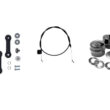Driving gets better with age – and here’s why. With experience comes confidence, and that confidence translates to better decision-making skills and overall safer driving. Plus, as we age, we tend to become more mature and level-headed, making us less likely to take risky maneuvers or make rash decisions on the road. And while health conditions may impact older drivers, it can actually make them more cautious and aware of their limitations while behind the wheel. So, if you’re worried about losing your edge on the road, fear not – the benefits of experience, maturity, and health make older drivers safer and more efficient.
Personal Experience with Driving as I Age
As a seasoned driver, I have seen how my driving skills have developed with age. When I first started driving, I was a little nervous and cautious on the road, but as I got more experience, I became more confident and efficient behind the wheel. I found that I was able to anticipate situations better and react appropriately to potential hazards.
Study Findings on Age and Driving Efficiency
Studies have shown that age can play a role in driving efficiency. According to data, drivers tend to be more efficient as they age until a certain age. As drivers become older, they gain more experience and develop better driving skills. However, beyond a certain age, driving ability may begin to decline. It is thought that this decline may be due to health issues that are related to age.
Young Drivers: Tickets, Denied Privileges, Accident Rates
While older drivers may be more efficient, young drivers between the ages of 16 and 25 have been found to be the cause of the most accidents on the road. These drivers are also more likely to be denied driving privileges and receive more tickets than those in other age groups. The reason for this is that young drivers are less experienced and more likely to take risks, making them more vulnerable to accidents.
The Benefits of Age and Experience on Driving
Despite the challenges of driving in old age, there are also many benefits to be gained from experience. One of the most significant advantages is that experienced drivers are more confident and relaxed while driving, making them less prone to accidents. Experienced drivers are also better able to anticipate potential hazards and understand the limitations of their vehicle.
When Does Driving Efficiency Peak?
According to the National Highway Traffic Safety Administration, drivers aged 60 to 65 have the lowest accident rate per mile driven. However, this does not mean that all drivers reach their peak efficiency at this age. The efficiency of each driver may vary depending on their driving habits, their level of experience, and any health issues they may have developed.
The Importance of Safe Driving Habits Across All Age Groups
Regardless of age, it is essential to practice safe driving habits on the road. This includes wearing seat belts, obeying the speed limit, and avoiding distractions while driving. It is also important to maintain good health, as physical and mental impairments can affect driving ability.
Adjusting Driving Habits as You Age
As drivers age, they may need to adjust their driving habits to ensure they are safe on the road. This could mean reducing driving distance and time, avoiding driving at night or in bad weather, and taking more frequent breaks during long drives. Additionally, it is essential to stay up to date with changes in driving laws and regulations.
Ways to Stay Safe on the Road at Any Age
There are several steps drivers can take to stay safe on the road, regardless of their age. These steps include:
- Wearing a seatbelt: Seatbelts are the most effective way to reduce the risk of injury during an accident.
- Obeying traffic laws: This includes following the speed limit, stopping at stop signs, and obeying traffic signals.
- Avoiding distractions: Drivers should avoid using their cell phone or engaging in other activities that may distract them while driving.
- Regular vehicle maintenance: Keeping vehicles in good condition can help prevent accidents due to malfunctions or other issues.
- Taking breaks: Drivers should take breaks during long drives to prevent fatigue and ensure they are alert and focused on the road.
In conclusion, driving efficiency can improve with age, but there are challenges and risks associated with driving at any age. It is essential for all drivers to practice safe driving habits and adjust their driving habits as they age to ensure they are safe on the road. Ultimately, it is up to each individual driver to take responsibility for their driving and make a commitment to stay safe.



